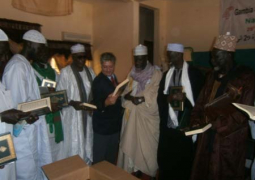No fewer than 35 participants drawn from the energy and environment sector, media representatives and other relevant stakeholders recently hold a one-day capacity building training on energy efficiency in the Gambia.
The programme, held at St. John’s School for the Deaf Conference Hall, was organised by YVE The Gambia.
Speaking at the forum, YVE Gambia executive director Joe Bongay gave a brief introduction of the programme, saying some of the objectives are to increase awareness about the CLENA and its areas of focus, to understand the adequate strategies for effective utilization of biomass and efforts to mainstream the energy-climate-development nexus into sectoral and cross sectoral strategies/programmes at national level.
He said the expected outcome is for members to acquire basic knowledge of the RETScreen software and enhance the capacity of participants on clean energy and energy efficiency gearing towards the successful implementation of the CLENA and other activities of YVE The Gambia.
According to him, in West Africa, almost 80% of the total energy consumption of the region comes from the traditional use of biomass.
In addition, over 90% of the population uses wood and charcoal for domestic cooking. The region’s over-dependence on natural forest resources is a driver of deforestation, desertification and increased GHG emissions.
The unsustainable use of wood resources is damaging to public health and reduces the time available for women and children to pursue other economically beneficial activities, such as education and entrepreneurship.
In addition, fossil fuel imports, on which most of the countries in the region depend, have proven to be a drain on governments’ budgets in light of the sustained high price of oil since 2008. This has focused attention on the ECOWAS region as a potential source of biomass for fulfilling regional and global demand for bio-fuels.
The production and use of bio-energy is growing in many parts of the world as countries seek to diversify their energy sources in a manner that helps promote economic development, energy security and environmental quality.
Modern bio-energy can provide multiple benefits, including promoting rural economic development, increasing household income, mitigating climate change, and providing access to modern energy services.
On the other hand, bio-energy can also be associated with risks, such as biodiversity loss, deforestation, additional pressure on water resources, and increased demand for agricultural inputs, land, and commodities.
The evaluation of the benefits and challenges of bio-energy production and use should reflect the national context.
For his part, Bubacarr Baldeh, YVE programme officer, stated that ECOWAS/ECREEE and the Global Bio-energy Partnership are collaborating to promote the transition away from the inefficient and unsustainable use of traditional biomass and towards the sustainable production and use of renewable biomass for cooking and other energy needs in West Africa.
On this ground YVE the Gambia, in cooperation with its international body JVE International, through its CLENA Project, aimed at clean energy and renewable energy that will respond to clean energy issues that are affecting the Gambia and the world at large, especially Africa.
YVE the Gambia will organize a capacity building training for its members for better understanding about the CLENA project and its main areas of focus. Expected topics to be discussed include clean energy and energy efficiency.
Representatives from NEA, PURA, and the Ministry of Energy all did a presentation on different areas of the energy and environment policies in the country.



